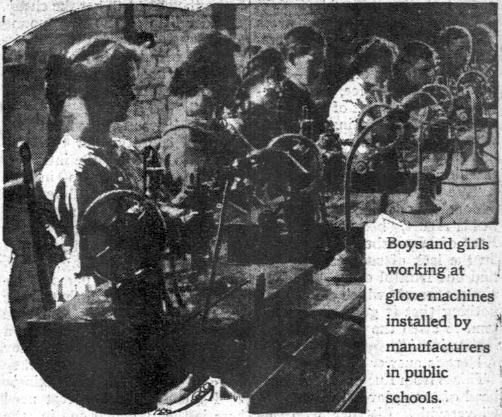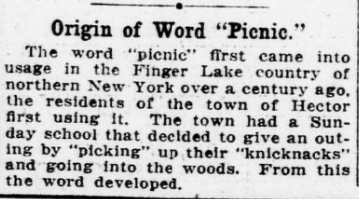
Imagine living in a town where the only work you can get is glove making. To make matters worse, the companies who employ these glove makers keep salaries deliberately low so that the population remains poor. Then, to increase production, the glove making companies worm their way into the school so that the only trade being taught is, you guessed it, glove making. Unfortunately, this is not a fairytale situation.

Glove Trust Uses Schools As Apprentice Shops
By Harry Burton
Gloversville, N.Y., Aug. 9. — Did you ever hear of Gloversville? Never.
Well, you ought to know about Gloversville. It is interesting in a number of ways. For instance, it is the metropolis of the cheaply paid glove industry. It is the capital of the glove trust. Also, and most remarkable of all the public schools of Gloversville manufacture human machinery for the glove trust.
It is a great experience (and you should have a kodak) to pass through the quiet streets of Gloversville and see gray haired grandpas and grandmas at the windows, making gloves. If it’s between meals, there will be mothers and other home bodies on the porches, making gloves.
You see, when a town has only one industry and all the manufacturers in that industry unite to keep wages down, everybody in the family has to pitch in to help on the high cost of living.
But in Gloversville they go a little further than that — even the little children in the public schools make gloves!
And why, you ask, must the little children be dragged into this pursuit in those first, fresh years when they ought to be learning just beautiful, useful things that will help fit them for things above glove making, if possible.
Well, there are three answers which you can pick up in Gloversville.
Here is the first one — from Supt. James A. Estee, who represents the view point of the public schools in this amazing situation, where public schools are training pupils to enter one trade, and are teaching no other trades.
“We have established our Vocational school,” says Supt. Estee in his report, “because, as Gov. Foss of Massachusetts has said, ‘in the lack of such training we find one fruitful cause of many aimless careers which can lead to nothing that is good and must tend to swell the number of our ineffectives’”
Here is answer No. 2.
This is from Lucius N. Littauer, head of the glove business in Gloversville. Litter, who was once a congressman and is a millionaire, appeared not long ago before the national ways and means committee with arguments which persuaded that committee to increase the tax on women’s and children’s gloves.
“Of course the manufacturers’ association is for such training,” says Littauer. “We aid it all we can. We need helpers and the pupils need work when they get out of school.”
And here is answer No. 3.
This is from Leo Grinnell, socialist member of the board of education.
“Pressure of the manufacturers has established a glove making course in the public schools because they want to get the cheap, efficient help of the very young and they do not want to bear the expense of maintaining an apprentice school for those who are desirous of entering the glove trade.”
Grinnell was elected to the board of education for two purposes — to work for the introduction of free text books in the schools and for abolishing the teaching of glove making to pupils.
“Before I said anything about it at the board meeting,” says Grinnell, “I made a personal investigation and found that of the 150 pupils who had elected to take this two year trade course, but a very few took it because they wanted it. Nevertheless, they were all learning glove making.
“I found that the great need here is the installation in the schools of a real vocational course where such things as carpentry, machine shop work, dressmaking and domestic science can be taught. The pupils who have technical bents long for such things.
“They say to me:
“‘We don’t want to learn glove making. We all know what a nasty, poorly paid trade it is. We want to learn something else so that when we get out of school we can begin to earn money right away at good, clean trades. Now, as things are, we have to learn glove making or nothing, it we want a trade.’
“And you can see what this situation is doing just as well as the manufacturers can see what it is doing — it is, by excluding the teaching of other trades, forcing into the glove making trade, hundreds of children who would otherwise take up something really worth while. And by creating such a supply it is keeping glove making wages way below par.”
Source: The Day Book (Chicago, Illinois newspaper). August 07, 1912.


